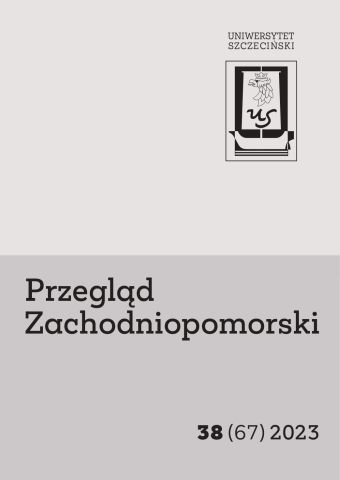Odwołania do autorów antycznych w Historycznym opisie miasta Szczecina Paula Friedeborna w kontekście programu edukacyjnego Pedagogium Książęcego w Szczecinie. Rekonesans badawczy.
References to ancient authors in Paul Friedeborn’s Historical description of the city of Szczecin in the context of the educational program of the Ducal Pedagogium in Szczecin. A research reconnaissance
Author(s): Małgorzata CieślukSubject(s): History, Cultural history, Local History / Microhistory, Modern Age, 17th Century
Published by: Wydawnictwo Naukowe Uniwersytetu Szczecińskiego
Keywords: modern chronicles; Paul Friedeborn; modern education; reception of ancient authors
Summary/Abstract: The considerations in this article are focused on various types of references (quotations, paraphrases, allusions, etc.) to authors who wrote in classical languages, introduced by Paul Friedeborn in his chronicle titled Historische Beschreibung der Stadt Alten Stettin in Pommern, with a particular emphasis on Greek and Latin ancient authors. The first research objective was to identify common points in the educational program of Pedagogium Stetinense and Friedeborn’s Historical description of the city of Szczecin based on the aforementioned references. This involved compiling a list of 16 “academic” authors whose works were introduced by Friedeborn into his chronicle by comparing the names of the creators and the titles of the texts mentioned in the university’s educational documentation and in the chronicle. From the chronicle text, 84 references to the works of these authors were extracted. In the second part of the considerations, these references were subjected to analysis, treated as a research attempt that allows for a closer examination of the historian’s craftsmanship and the strategies he adopted related to incorporating references to the works of other authors. All quotations from Cicero’s works were subjected to detailed analysis, while references to other “academic” authors were examined at a higher level of generality. The focus was on three aspects. The first is the use of various linguistic variants and an attempt to indicate possible reasons for this diversity. The second is the use of different forms of describing individual mentions, allowing for a closer look at Paul Friedeborn’s work methodology. Finally, the third aspect, addressed to a limited extent, is an attempt to answer the question of the sources from which Friedeborn borrowed excerpts from the works of ancient authors for his chronicle. In conclusion, it is emphasized that the considerations conducted in this article have the character of research reconnaissance. The conclusions formulated based on references to “academic” authors should be verified in the future through the analysis of all references to authors who wrote in classical languages introduced by Friedeborn into the chronicle’s text.
Journal: Przegląd Zachodniopomorski
- Issue Year: 38/2023
- Issue No: 01
- Page Range: 100-125
- Page Count: 26
- Language: Polish

